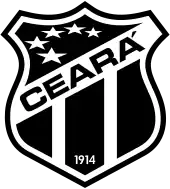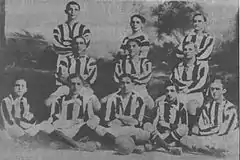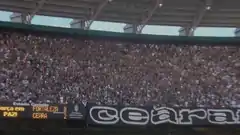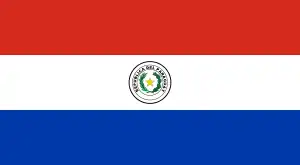Ceará Sporting Club
Ceará Sporting Club, or Ceará, as they are usually called, is a Brazilian football team from the city of Fortaleza, capital city of the Brazilian state of Ceará, founded on June 2, 1914, by Luís Esteves and Pedro Freire. Ceará is one of the most traditionally successful clubs in the Northeast region of Brazil alongside Bahia, Santa Cruz, Sport, Náutico, Vitória and their city rivals Fortaleza.
 | |||
| Full name | Ceará Sporting Club | ||
|---|---|---|---|
| Nickname(s) | Vozão (Big Grandpa) Vovô (Grandpa) Alvinegro Cearense (Black and White from Ceará) O Mais Querido (The Dearest) | ||
| Founded | June 2, 1914 | ||
| Ground | Castelão | ||
| Capacity | 63,903[1] | ||
| President | João Paulo Silva | ||
| Head coach | Vagner Mancini | ||
| League | Campeonato Brasileiro Série B Campeonato Cearense | ||
| 2022 2022 | Série A, 17th of 20 (relegated) Cearense, 6th of 10 | ||
| Website | Club website | ||
|
| |||

History
On June 2, 1914, the club was founded as Rio Branco Football Club by Luiz Esteves Junior and Pedro Freire. Later, some of their friends also joined: Gilberto Gurgel, Walter Barroso, Raimundo Justa, Newton Rôla, Bolívar Purcell, Aluísio Mamede, Orlando Olsen, José Elias Romcy, Isaías Façanha de Andrade, Raimundo Padilha, Rolando Emílio, Meton Alencar Pinto, Gotardo Morais, Artur de Albuquerque, Cincinato Costa, Carlos Calmon and Eurico Medeiros. As Rio Branco Football Club, the team colors were white and lilac. In 1915, on their first birthday, the club changed its name to Ceará Sporting Club.
In 1941, Ceará won the Campeonato Cearense, the same year of the inauguration of Presidente Vargas stadium. From 1961 to 1963, the club was three times consecutive state champion. In 1969, Ceará won the Northeast Cup.
In 1970, ended the seven-year titleless state championship period. In 1971, Ceará was the last placed team in Campeonato Brasileiro Série A first edition. From 1975 to 1978, the club was four times in a row state champion.
In 1985, Ceará finished 7th in the Brazilian League. This is the best league position of the club in the Brazilian Championships. In 1994, the club finished Brazilian Cup runners-up, beaten by Grêmio in the final. In 1995, Ceará participated in the Copa CONMEBOL, the club's first international championship, becoming the only club of Ceará State to play an international tournament. In 1996, the team administrator was Forró bands businessman Emanuel Gurgel. The team changed its home shirt color to all black. Because of this, the team was nicknamed "Urubu do Nordeste" (Northeast Vulture). From 1996 to 1999, the club was state champion four times in a row .
In 2002, Ceará won the state championship, for the first time in three years. In 2005, Ceará reached the Copa do Brasil semifinals. The club was defeated by Fluminense. In 2006, the club won the state championship after 4 years without winning the competition.
In 2010, after a 17-year absence, Ceará was promoted back to the Brazilian League, after finishing third in the 2009 Campeonato Brasileiro Série B. They finished in 12th position, achieving a place in the 2011 Copa Sudamericana.
In 2011, Ceará reached the 2011 Copa do Brasil semi-finals. Ceará ended Ronaldinho's Flamengo's unbeaten streak in the previous round winning the away game, and drew the home game, eliminating the Rio de Janeiro team in a notorious upset. Ceará, however, was defeated by Coritiba in the semi-finals.
Honours
State
Stadium

Ceará's home venue is Estádio Carlos de Alencar Pinto, capacity 3,000, but the team also plays at Castelão Stadium which has a capacity of 60,326,[2] and at Presidente Vargas Stadium, which has a 22,228 capacity.
Rivals
Ceará's greatest rival is Fortaleza. It is the biggest derby in Fortaleza city. It has been played 603 times, with Ceará winning 213 times, Fortaleza winning 187 times and 203 draws. [3] Ceará's second biggest rival is Ferroviário, the third biggest club of Fortaleza city. This derby has been played 302 times, with 140 wins for Ceará, 71 wins for Ferroviário and 91 draws. [4]
Mascot
The team mascot, an old man known as "Vovô" ("Grandpa") dressing Ceará uniform was designed by Cearense cartoonist Mino for the "Ceará: Paixão Total" Project ("Ceará: Full Passion" Project).
The team mascot appeared in late 1919, when Meton de Alencar Pinto, former president of Ceará SC, coached young players of America Football Club, a small club from the city, in the Porangabussu training center. Meton, who used to call the kids as "my grandsons", asked them to "go easy on grandpa". Afterwards, the nickname started to apply to the team of Ceará as well, helped by the seniority of the club; Ceará Sporting Club was the first football team founded in the state.
Logo evolution

The first logo was the club's first as Ceará Sporting Club, and was used from 1915 to 1954.
The second logo was used from 1955 to 1969 and was inspired by the Santos logo.
The third logo was used from 1970 to 2003.
The fourth logo is the current team logo, and was adopted in 2003. The logo is a restyled version of the previous logo created by Adman Orlando Mota. This logo introduced the white stars and the foundation date.
Players
First-team squad
- As of 21 June 2023
Note: Flags indicate national team as defined under FIFA eligibility rules. Players may hold more than one non-FIFA nationality.
|
|
Academy
Note: Flags indicate national team as defined under FIFA eligibility rules. Players may hold more than one non-FIFA nationality.
|
|
Out on loan
Note: Flags indicate national team as defined under FIFA eligibility rules. Players may hold more than one non-FIFA nationality.
|
Staff
Current staff
- As of 5 January 2023.[5]
| Position | Name |
|---|---|
| Coaching staff | |
| Head coach | |
| Assistant head coach | |
| Assistant head coach | |
| Assistant head coach | |
| Goalkeepers trainer | |
| Goalkeepers trainer | |
| Performance analyst | |
| Performance analyst | |
| Medical staff | |
| Fitness coach | |
| Fitness coach | |
| Fitness coach | |
| Doctor | |
| Doctor | |
| Doctor | |
| Doctor | |
| Physiotherapist | |
| Physiotherapist | |
| Physiotherapist | |
| Physiotherapist | |
Managers
 Jair Pereira (2005)
Jair Pereira (2005) Valdir Espinosa (2005)
Valdir Espinosa (2005) Zé Teodoro (2006), (2009)
Zé Teodoro (2006), (2009) Paulo César Gusmão (2009–10)
Paulo César Gusmão (2009–10) René Simões (2010)
René Simões (2010) Estevam Soares (2010)
Estevam Soares (2010) Mário Sérgio (2010)
Mário Sérgio (2010) Vágner Mancini (2011)
Vágner Mancini (2011) Estevam Soares (2011)
Estevam Soares (2011) Paulo César Gusmão (2012)
Paulo César Gusmão (2012) Ricardinho (2013)
Ricardinho (2013) Sérgio Guedes (2013)
Sérgio Guedes (2013) Sérgio Soares (2013–14)
Sérgio Soares (2013–14) Paulo César Gusmão (2014)
Paulo César Gusmão (2014) Dado Cavalcanti (2015)
Dado Cavalcanti (2015) Silas Pereira (2015)
Silas Pereira (2015) Geninho (2015)
Geninho (2015) Marcelo Cabo (2015)
Marcelo Cabo (2015) Lisca (2015–16)
Lisca (2015–16) Sérgio Soares (2016)
Sérgio Soares (2016) Gilmar Dal Pozzo (2017)
Gilmar Dal Pozzo (2017) Givanildo Oliveira (2017)
Givanildo Oliveira (2017) Marcelo Chamusca (2017–18)
Marcelo Chamusca (2017–18) Jorginho (2018)
Jorginho (2018) Lisca (2018–19)
Lisca (2018–19) Enderson Moreira (2019)
Enderson Moreira (2019) Adílson Batista (2019)
Adílson Batista (2019) Argel Fucks (2019–20)
Argel Fucks (2019–20) Enderson Moreira (2020)
Enderson Moreira (2020) Guto Ferreira (2020–21)
Guto Ferreira (2020–21) Tiago Nunes (2021–22)
Tiago Nunes (2021–22) Dorival Júnior (2022)
Dorival Júnior (2022) Lucho González (2022)
Lucho González (2022) Gustavo Morínigo (2023–present)
Gustavo Morínigo (2023–present)
Ultras groups
References
- "CNEF - Cadastro Nacional de Estádios de Futebol" (PDF) (in Portuguese). January 18, 2016. Retrieved June 6, 2016.
- "Estádio Castelão". SESPORTE. Archived from the original on October 10, 2008. Retrieved September 12, 2008.
- pt:Clássico-Rei
- pt:Clássico da Paz (Fortaleza)
- "Comissão Técnica Profissional". cearasc.com (in Brazilian Portuguese). Retrieved August 25, 2022.